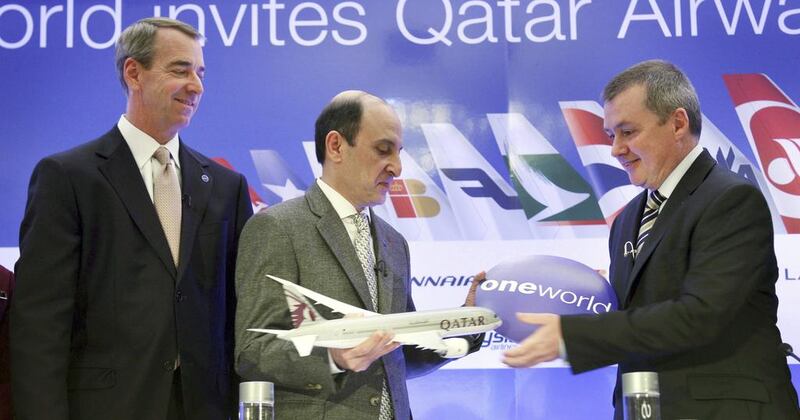A move by Qatar Airways to acquire part of the British Airways parent IAG opens a new phase of consolidation in the global aviation industry and helps Doha to boost its access to the lucrative transatlantic market.
It also represents a fascinating alliance between two of the industry’s biggest personalities in the form of Akbar Al Baker, the chief executive of Qatar Airways, and Willie Walsh, his counterpart at IAG.
The surprise acquisition by Qatar Airways of a 9.99 per cent stake in the group that owns both BA and Iberia of Spain comes as IAG itself considers a US$1.52 billion bid for Aer Lingus, the Irish flag carrier in which Abu Dhabi’s Etihad Airways has a 4.11 per cent stake.
So where is Akbar and Willie’s flight plan heading and what does it mean for regional rivals Emirates and Etihad?
The deal gives IAG a big pot of cash to fund its own expansion plans, which may include snapping up Mr Walsh’s old airline Aer Lingus, while at the same giving Qatar Airways a new conduit to expand, build traffic through Doha and compete with Dubai and Abu Dhabi on long-haul East-West routes.
“Qatar’s investment in IAG is an affirmation of IAG’s business model and strategy,” says Stephen Furlong, an analyst at Dublin-based Davy Stockbrokers. “It’s also a further indication of the direction the industry is going – that is to say more consolidation with larger airlines dominating.”
It comes at a time when all three big Arabian Gulf carriers are trying to build their capacity on transatlantic routes where despite the addition of new services from Dubai, Doha and Abu Dhabi to airports such as Los Angeles, Dallas-Fort Worth and San Francisco, margins remain comparatively attractive.
And it gives a potential traffic boost not only to Doha and its spanking new $17bn airport but also to Madrid and Heathrow, which last month lost its crown as the world’s busiest airport measured by international traffic, to Dubai.
In one scenario, the investment could pave the way for Qatar Airways to route its Americas-bound long-haul traffic originating from the East through Madrid to South America on an Iberia codeshare, while using Heathrow for the same purpose to send North American-bound passengers through London on BA codeshares.
However such a plan would not be without its hurdles, according to Peter Morris, the UK-based chief economist at the Ascend consultancy.
“If you look at the practicalities, you have got Qatar Airways flying to Terminal 3 and BA flies into Terminal 5. My experience is that this is not a very easy connection to make. It’s quite difficult to do it. It is not easy to walk with your luggage.”
Qatar Airways joined IAG’s Oneworld Alliance in 2013 and there were expectations in the industry that the pair would seek to collaborate further.
The state investment fund Qatar Holding has a 20 per cent stake in London Heathrow.
With Qatar Airways now expected to expand its codeshares with IAG, attention has turned to IAG’s own attempts to acquire Aer Lingus, and along with it the Irish flag carrier’s valuable Heathrow slots.
While some analysts have highlighted the attraction of these slots to any potential bidder, others say their value may be overstated.
“In my view the current obsession with Heathrow slots is a little outdated given the growth and existence of all these Gulf carriers,” says Mr Furlong.
Still, they remain of huge political significance for the Irish government, which owns 25.1 per cent of the airline and wants concrete assurances over its air future connectivity to the UK and beyond.
As was widely expected, Mr Walsh this week moved to give reassurances that ownership of the slots would be left with Aer Lingus in a bid to get the deal over the line.
The progress towards a potential deal will be watched closely by Emirates and Etihad.
While Abu Dhabi, Doha and Dubai are all seeking to cement their global hub status, their approaches have been very different. Emirates has grown organically, spending billions on huge plane orders to add network capacity while Etihad has added bolt-on acquisitions of ailing carriers to add more spokes to its Abu Dhabi hub in what have become known as equity alliances. Such equity alliances have been struck with carriers that include Air Serbia, Air Berlin and Aer Lingus.
While Doha looks to London for its next phase of growth, Abu Dhabi is eyeing Rome.
Etihad’s latest acquisition of Alitalia creates an opportunity for the Abu Dhabi-based carrier to benefit from Rome’s position as a major European hub.
“The primary benefit is greater access in the Italian market, both bringing passengers to Italy and bringing Italians abroad,” says Will Horton, a senior analyst at the Centre for Aviation (Capa).
“The secondary benefits are regional connections beyond Italy and then long-haul connections. We’ll have to see how inclined passengers are for a two-stop itinerary through Abu Dhabi and then Rome/Milan when there are already one-stop options available,” he added.
The relationship between the big three Gulf carriers and their European rivals has become increasingly testy in recent years with Lufthansa’s chief executive accusing Gulf carriers of receiving unfair state subsidies and government support – a claim that they have rejected. Tim Clark of Emirates replied in a 139-page report published in 2012, saying that more than 18,000 jobs in Germany were dependent on the economic activities of Emirates, while the value of money spent by incoming tourists carried by Emirates exceeded €1.6bn (Dh6.66bn) each year.
In an interview with The National last month, he expanded on the theme:
“If there had been any truth in the allegation of big state subsidies to Emirates, the European airlines would have pinned it on us years ago, he said. “Now even they accept that we’re transparent. It’s pitiful what they’ve resorted to over the years to brand us with the subsidies brush.”
As competition increases and old airline empires are threatened, the barbed comments will continue to fly between Europe and the Gulf over what does or does not represent fair play.
But this deal represents a new and perhaps more pragmatic approach by Mr Walsh and Mr Al Baker, which once again raises the stakes of competition between the region’s big three.
It may also be the first acknowledgement from the legacy carriers of Europe that if you can’t beat them in the Gulf, you can at least join them.
selgazzar@thenational.ae
scronin@thenational.ae





